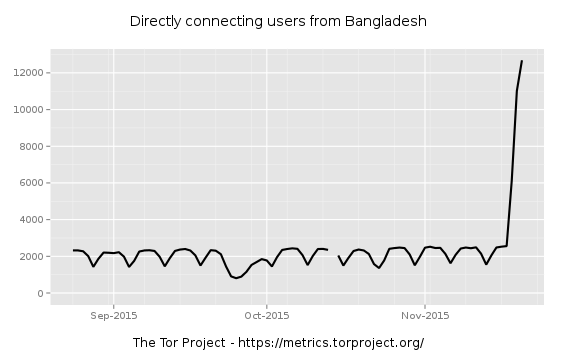Last Wednesday, on November 18th, the Bangladeshi government ordered blocking of social messaging apps until further notice - first blocking Whatsapp, Facebook, Messenger, and in a second directive later the same day shutting Line, Tango and Hangouts. The decision to block the sites came immediately after the Supreme Court upheld death penalty convictions against two former opposition leaders for their role in the 1971 Liberation War. Citing “security reasons” the government seems keen to try and restrict communications in a bid to dampen protests that might happen in response to the ruling - but in the meantime, there have been some interesting developments in use of social media in Bangladesh.
On the same day as the block on social messaging was put in place, a “misunderstanding”, in the words of the State Minister for Post and Telecommunications Tarana Halim, led to the entire Internet being blocked in Bangladesh for around 90 minutes - the first time the internet was blocked in the country. Apparently directives to block all social messaging apps had become confused with…the internet.
The government had given some warning that they were prepared to sink to the level of blocking certain sites just the week before, when Prime Minister Sheikh Hasina announced that popular online messaging and calling services WhatsApp and Viber would be blocked temporarily “if needed, in order to nab militants and prevent terrorist activities in the country”, according to the Dhaka Tribune..
So what has happened while these sites have been blocked?
For one, some unlikely advocates of secure messaging services have surfaced - like bdnews24, which recommended secure anonymous browser Tor to its 110,000 followers:
To avoid #Bangladesh government ban on social-media tools like #Facebook download Tor: https://t.co/TmEbNGHBeQ pic.twitter.com/ChTx6iXuMk
— Bangladesh News 24 (@bdnews24) November 18, 2015It looks as though people listened to them, too - from Tor’s metrics site the number of users in Bangladesh has risen incredibly steeply since the blocking, from something around 2000 users to 12000 in just a few days:

(screenshot taken on Nov 22)
And seemingly even the ruling party in the government themselves may have taken this advice. Despite being the ones who put the ban in place, the Awami League’s official page has been regularly updated with important political updates like this:

Somewhat incredibly, even the Minister of ICT, Zunaid Ahmed Palak, updated his page during the blockade with this post about Digital Bangladesh. Oh the irony. (here’s the translation)

Despite the fact that both of the hangings took place on Saturday night, the ban seems still to be in place- but we’ll see for how long.
In the meantime, to those in Bangladesh I recommend checking out Tor, or using encrypted messaging apps like Signal. If there’s any silver lining we can draw from this gross misuse of power, perhaps it’s that more people will starting using encrypted and secure technologies to communicate - ones that the government can’t block.